The Library of Congress recently signed a deal to accept 3 million dollars worth of “technology, services and funding” from Microsoft towards building a new website powered by Microsoft’s Silverlight plug-in. I (Casey) usually leave the blogging to Tim, but I’ve got to say something about this.
Microsoft, in general, is very good to libraries, and libraries are very good to them. Microsoft gets huge tax breaks for donating software licenses — something that doesn’t really cost them a thing — and libraries get software they couldn’t afford otherwise.
This is a different beast, however. It sounds like Microsoft technologies will be used from the ground-up — if you use Microsoft’s Silverlight to do the front-end, your developers pretty much have to use Visual Studio and Microsoft languages, your database admins have to use MS SQL Server, and your systems admins have to use Windows and IIS. In any case, it seems unlikely that Microsoft would consult on a project and not recommend you use Microsoft as much as possible.
Once you’re locked in to the entire Microsoft stack, you pretty much can’t change a single piece without completely redoing your entire IT operation from top-to-bottom. When the free deal expires or you need new servers, you end up having to buy new Microsoft licenses and software. It’s like giving somebody a kitten for a present — they’ll still be paying for and cleaning up after your gift 10 years from now.
Most disturbingly, users are locked in, too: anybody using an iPhone, an old version of Windows, any version of Linux, or any other operating system or device not supported by Silverlight will be unable to use the Library of Congress’ new website. How is that compatible with the principles of democracy or librarianship? It’s taxation without web presentation. And how exactly is that a quantum leap forward? (If the LOC really wanted to make a quantum leap, it would open up its data.)
Giant package deals are the wrong way to make both technical and business decisions about software; it doesn’t matter who’s doing the packaging, or how. You should be able to use the best operating system for the job, the best database for the job, and the best programming language for the job. You should be able to hire developers and systems administrators, not Microsoft developers and Windows administrators, and should give them the freedom to use the best solution, not the Microsoft solution. Sometimes the Microsoft solution is best, sometimes it isn’t, but that’s something that shouldn’t be dictated unilaterally.
“I take comfort when I see one of our competitors looking to hire Microsoft developers instead of software developers, for reasons the hacker/entrepreneur Paul Graham explained well:
If you ever do find yourself working for a startup, here’s a handy tip for evaluating competitors. Read their job listings. Everything else on their site may be stock photos or the prose equivalent, but the job listings have to be specific about what they want, or they’ll get the wrong candidates.”
“During the years we worked on Viaweb I read a lot of job descriptions. A new competitor seemed to emerge out of the woodwork every month or so. The first thing I would do, after checking to see if they had a live online demo, was look at their job listings. After a couple years of this I could tell which companies to worry about and which not to. The more of an IT flavor the job descriptions had, the less dangerous the company was. The safest kind were the ones that wanted Oracle experience. You never had to worry about those. You were also safe if they said they wanted C++ or Java developers. If they wanted Perl or Python programmers, that would be a bit frightening– that’s starting to sound like a company where the technical side, at least, is run by real hackers. If I had ever seen a job posting looking for Lisp hackers, I would have been really worried.”
But it’s disappointing to see an institution you respect, admire, and fund with your tax dollars going down that same road. It’s even more disappointing because the Library of Congress does make smart decisions about technology. They announced another major project a few months back that took an entirely different approach to selecting the tools they would use. The people behind the World Digital Library sat down and thought about the best tools for the job, and they came up with an interesting and eclectic list: “python, django, postgres, jquery, solr, tilecache, ubuntu, trac, subversion, vmware”. Those tools are free, open-source, designed with developer productivity in mind, aren’t tightly linked to each other, and don’t inherently limit who can access your website. That’s what should matter.











 ThingISBN, our popular ISBN-based API, supports and returns data for two more identifiers: LCCN and OCLC.
ThingISBN, our popular ISBN-based API, supports and returns data for two more identifiers: LCCN and OCLC.

